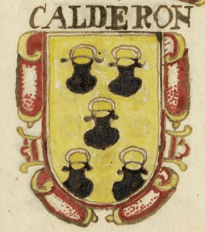Mencía Calderón facts for kids
Quick facts for kids
Mencía Calderón y Ocampo
|
|
|---|---|
| Adelantada of the New World | |

Coat of Arms belonging to his paternal surname
|
|
| Born | 1514 Extremadura, Spain |
| Died | c.1564 Asuncion, Paraguay |
| Spouse(s) | Juan de Sanabria y Alonso de Hinojosa |
| Father | Alonso Calderón |
| Mother | Ana Ocampo |
Mencía Calderón y Ocampo (born 1514, died around 1564) was a brave Spanish noblewoman. She was the first woman to lead an expedition to the Río de la Plata region in South America.
Contents
Who Was Mencía Calderón?
Mencía Calderón y Ocampo was born in a town called Villa de Medellín in Badajoz, Spain. Her parents were Alonso Calderón and Ana Ocampo. Her family was part of the nobility in the region of Extremadura.
Early Life and Family
Mencía married Juan de Sanabria, a Spanish explorer and nobleman. Sadly, Juan de Sanabria passed away just before he was supposed to leave for the New Spain (America). Through her mother, Mencía Calderón was related to famous Spanish explorers like Francisco Pizarro and Hernán Cortés. Her family had strong connections to important Castilian noble families.
A Journey to the New World
On April 10, 1550, Mencía Calderón began her journey to America. About 300 people traveled with her on this expedition. This group included important captains like Salazar and Saavedra. Mencía's own daughters were also on board. There were also 50 young women looking for husbands, wives of other explorers, and 80 sailors. Even the adventurer Hans Staden, who later wrote about his travels, was part of this group.
The ships faced many challenges during their voyage. They survived strong storms and attacks from French pirates. Eventually, they managed to reach the island of Santa Catalina. From there, they sailed to the coast of Brazil. They stayed in Brazil for a year to fix their ships. They even built new, stronger ships using parts from the old ones. After this time of rest, they continued their journey to Asunción.
Leading the Expedition
During the journey, there were often disagreements between Captain Salazar and Saavedra. It was Mencía who stepped up to organize the expedition. She helped keep the group together and moving forward.
Mencía took on the important role of "Adelantada." This title meant she was a leader of a frontier expedition. She guided a group of men and women across 1,600 kilometers (about 1,000 miles) of thick rainforest. They followed the same path that explorers like Alejo García and Alvar Núñez Cabeza de Vaca had taken years before.
They finally reached Asunción in 1555. When they arrived, some unexpected situations happened. The women who had traveled so far to meet their husbands found that some of them had started new families with local indigenous women. This led to some surprising and difficult moments for everyone involved.
See also
 In Spanish: Mencía Calderón para niños
In Spanish: Mencía Calderón para niños
 | Chris Smalls |
 | Fred Hampton |
 | Ralph Abernathy |

